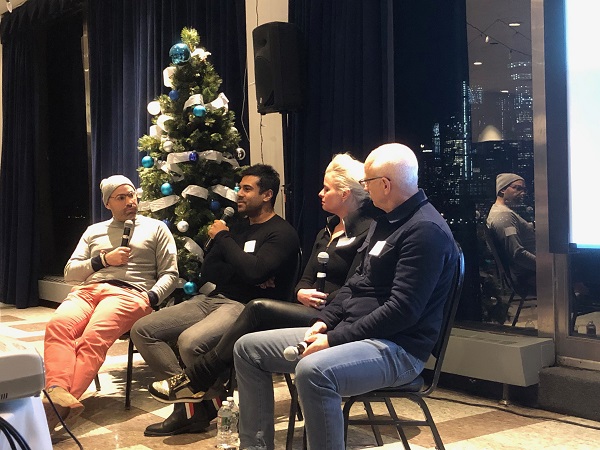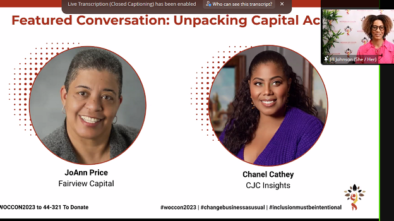What is it Like to Swim with the Sharks? “Shark Tank” Survivors Tell All to NJ Tech Meetup
Appearing on the Emmy-winning television show “Shark Tank” – now in its 10th successful season on the ABC network – is the dream of countless entrepreneurs.
Three survivors of that “life-changing” experience joined host and moderator Aaron Price for a freewheeling, behind-the-scenes panel discussion at NJ Tech Meetup, held in Hoboken, at Stevens Institute of Technology, on December 18.
The “Shark Tank” entrepreneur panelists also provided some recommendations both for pitching on the show and in-person to prospective investors. The panelists were:
- Nayeem Hussain – Keen Home (received a $750K investment from Robert Herjavec, and has raised approximately $10 million since the initial launch) is a system that provides smart home energy efficiency and savings by only heating and cooling the rooms you are actually using.
- Lori Cheek – Cheekd (no Shark deal) is an app that reimagines online dating via Bluetooth technology, striving to make missed connections obsolete. It helps you take real-time/real-world connections and transfer those conversations online.
- Howie Busch – DudeRobe (no Shark deal) is a luxurious towel-lined, hooded bathrobe targeted exclusively at men, featuring extra-deep pockets for storing manly gadgets and gear. It’s also sold with matching DudeShorts for the full masculine experience.
When you’re sitting at home watching “Shark Tank” from the comfort of your couch, it may seem as if pitching were an effortless process. According to the three founders on the panel, however, an amazing amount of preparation, hard work and rehearsal happens along the way, before you see finally see the contestants on prime-time TV.
Not surprisingly, only a select few of the thousands of eager applicants are offered a chance to participate in the vetting and selection process, which is still a long way from successfully landing a big investment from one or more of the Sharks.
According to one panelist’s estimate, only about one-quarter of 1 percent of the total applicants ultimately make it on air during a given season. It was somewhat surprising to learn that being invited to participate in the tapings in Los Angeles still doesn’t guarantee that your segment will actually air.
It’s a different ratio each season, but dozens of entrepreneurs who are invited to Los Angeles apparently make the trek with high hopes, only to have their dreams dashed when their pitches end up on the cutting room floor. One panelist estimated that about 100 of 160 contestant pitches end up on TV.
So how do the producers of “Shark Tank” find entrepreneurs who want to be on the show? Although many would-be contestants fill out the online application, submit supporting materials (including videos), and then cross their fingers and wait, other contestants are proactively discovered through crowdfunding sites such as Kickstarter and Indiegogo.
Busch from DudeRobe achieved his targeted total on Kickstarter in only two days; and “Shark Tank”’s producers, noting that success, contacted him to see if he wanted to appear on their show.
Ironically, he had to rush the manufacturing process to ensure that ample inventory would be ready in time for the show’s airing, as he didn’t want to tell disappointed buyers that he was out of stock.
After they arrived in Los Angeles, the panelists said, they spent as much as five days at their hotel, as well as an unnerving amount of time waiting around the Sony production set where the taping would take place.
Lori mentioned meeting fellow contestants poolside at their hotel. While there, she couldn’t help overhearing lots of pitching practice, although everyone was warned against speaking to each other before appearing on the show.
There is usually is an in-studio rehearsal day for honing your all-important, 90-second opening pitch, and this rehearsal takes place exclusively in front of the show’s producers. At this stage, the producers are generally supportive and happy to offer helpful suggestions. According to panelists, those same people act a lot differently when the cameras are rolling the next day, barely acknowledging you and acting in a business-like way.
The Sharks are nowhere in sight during this preshow process. In fact, the contestants must sign an affidavit stating that they have never met with or approached any of them prior to the show’s taping. There is plenty of time to get to know them and their handlers during the extensive due diligence process.
On the show, Hussain received the $750,000 that he and his cofounder were seeking. After the taping, they did their best to maintain leverage by not finalizing the contract until the show aired, which was several months later.
They held out despite repeated warnings from Herjavec’s advisers that if Keen Home did not accept the offered terms, they would push the producers not to air the episode at all. Luckily, the episode did air and they reached and signed a mutually acceptable agreement soon after.
The edited version of each segment that you see on TV, which is about 12 minutes long, typically comes from a nonstop two-hour session in front of the Sharks, with the cameras rolling the entire time. The panelists at NJ Tech Meetup highly recommended heeding the advice they had received from previous contenders, which was to be extremely enthusiastic and not give the editors any excuse to highlight any negative behavior or annoying, nervous mannerisms.
Another fact that came out during the discussion was that there is a special “members only” online group for former “Shark Tank” contestants. This is a great resource for gleaning all kinds of helpful information, strategic relationships and introductions. One panelist referred to this as a “priceless ecosystem for people that have been on the show.”
According to the panel, although the show’s producers want good companies and investable opportunities on “Shark Tank,” they seem to enjoy booking the occasional train wreck. After all, ABC is in the entertainment business, and they reserve the right to edit segments accordingly.
There was some debate among the panelists about the most effective type of pitch – whether in front of the Sharks, venture capitalists or other capital sources. The majority said that a problem/solution narrative is usually most effective. It’s also best to tell a story. Also, when approaching VCs, it’s invariably ideal to come to them with a “warm” introduction, as opposed to via a cold call or email.
According to the panel, even if you don’t land a deal from one of the Sharks, the publicity from being on the show can lead to more publicity and a huge bump in sales. The estimated ABC audience for initial airings is approximately 8 million people, with an additional 300,000-plus generally tuning in for encore viewings on CNBC.
Hussain stressed the importance and value of generating media exposure from an array of sources, given that hiring a PR firm can get very pricy. According to Cheek, despite coming away empty-handed from the Sharks, she has raised six times the money she originally asked for on TV.
Some additional advice from the panelists:
- First and foremost, make sure you confirm that there is sufficient demand for your product or service.
- Intellectual property and the protection of it are good to have, as they can enhance the value of your enterprise, especially when you are exiting.
- Don’t push people too hard to sign your NDAs, and don’t be afraid to share your creative and business ideas with others.
- Lastly, find a good startup-friendly law firm.




